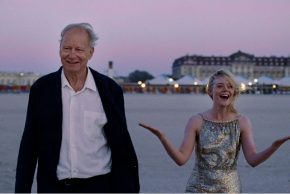Article: Győző Nagy
Translation: Zsófia Hacsek
There was a time when musicians kind of felt obligated to create their own versions for jazz standards. Then there was a time when playing covers seemed like a lack of originality. Nowadays, luckily, those days are gone and nobody cares if a new band becomes famous with a good Beatles or OutKast cover. But do we also accept if a classical piece is transformed to be a 21th century one? Or is that sacrilege?
If you think that such innovative musical adventures are worth experiencing, you should be at Uri Caine’s concert on 10 April. If you are unsure, it might be a good idea to give it a try, as Uri Caine – who has been to Hungary several times – will play with great fellow musicians as part of their Bartók Project.
Uri Caine’s first visit to Hungary happened in his twenties. The Philadelpia-born pianist is one of the best “tourist guide” within Bartók’s world: he started his journey with the piano with the help of Bartók’s Mikrokosmos. Ever since, he has played Wagner, Mahler, Mozart, Verdi, Schumann or Bach, and he became a passionate advocate for classical music.
Is it surprising that Bartók has a connection to jazz? We should consider what they indeed have in common: raw strength behind the seemingly polished music, or the parallel presence of composition structure and freely flowing improvisation. Many jazz legends have referred to Bartók as a role model for the last 100 years, such as Duke Ellington, John Coltrane, Miles Davies, Charlie Mingus or Chick Corea. Uri Caine himself stated recently:
“For me as a jazz musician, it is fascinating to see how Bartók structured his works. I see a very conscious building work, and it’s obvious that he cared a lot about forms and proportions. Many people wrote about this already, but for me this is the most important thing about him.”
His Hungarian Project which was introduced in the Trafó in 2006 has already made him an honorary Hungarian. Caine has worked in the Viennese Volksoper, the Concerto Köln, the Arditti Quartet and the BBC Symphonic Orchestra. And just to name a few musicians: he has worked with jazz legends Don Byron, John Zorn, Arto Lindsay, and even with representatives of more popular genres, such as Pink Floyd-lead David Gilmour, dummer-singer-activist-producer Questlove from The Roots, or Luke Vilbert who is one of the most renowned figure in the scene of electronic music.
This time, he will play with old buddies. One of them is Jim Black (percussion) with whom he grew up together in Seattle and they have been aces of the New York jazz scene at the same time for 30 years, and there is saxophonist and clarinetist Chris Speed. New faces also joined this project from the Hungarian scene: Petra Várallyay (violin), Miklós Lukács (cymbel), and Mátyás Szandai (contrabass). They are not only very skilled but also original musicians, who fit well to the topic of Bartók Project summarised by Uri Caine:
“In these short compositions, Bartók’s building work is clear and logical, which helps an improvising musician a lot. We use his pace signals, the musical structure he has set up, or we examine what processes take place in the depths of his music, and meanwhile we also add what we think and know about music.”
Get your tickets here!
Article: Győző Nagy
Translation: Zsófia Hacsek

























Comments